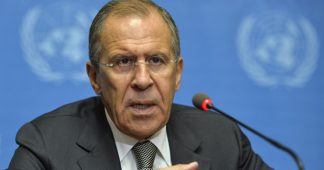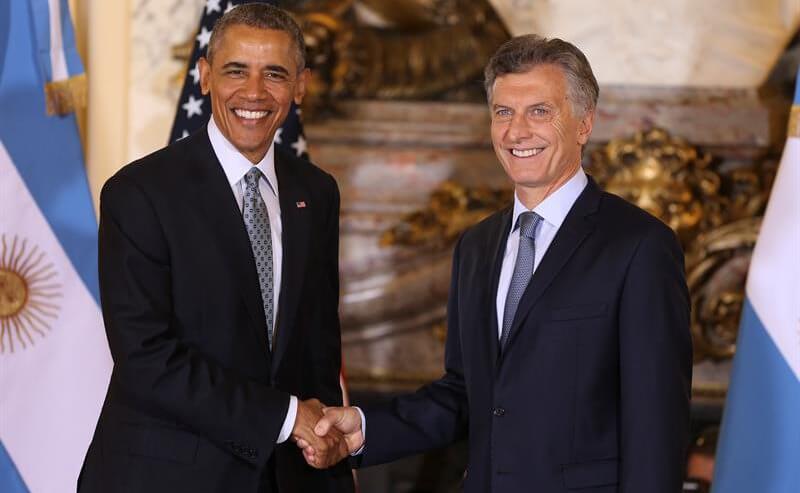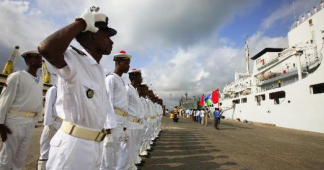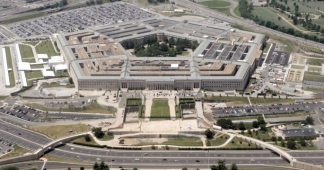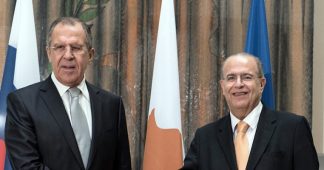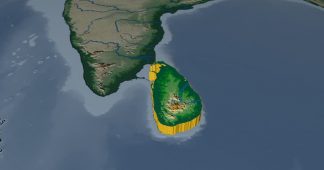Posted on
Monday was Martin Luther King Jr. day, and on a day where people often discuss his dreams, they rarely discuss his nightmares. It was in early 1967 while Dr. King was eating breakfast and reading a magazine when he came across images of children in Vietnam who had been struck by Napalm. He said afterwards that “I came to the conclusion that I could no longer remain silent about an issue that was destroying the soul of our nation.” It was then that Dr. King decided to come out publicly against the war in Vietnam, delivering an address that is among the greatest speeches ever delivered by anyone in this country’s history. Dr. King’s April 4th, 1967 speech in front of 3,000 people at the Riverside Church in New York City, delivered a scathing rebuke of not only the war in Vietnam, but the militarized United States, which he referred to as “…the greatest purveyor of violence in the world today”. That speech earned Dr. King the anger of nearly everyone, including US liberals and fellow civil rights activists. This highlights a problem that is still all too prevalent today. That is, it is still highly taboo to criticize US foreign policy and the violent war machine that is behind it.
This past weekend in Baltimore, I had the honor of being part of a conference that set out to not only criticize the US war machine, but put an end to the foreign military bases the United States has planted all over the world. The Coalition Against U.S. Foreign Military Bases hosted a conference that was attended by antiwar groups from all over the world to highlight the ways in which US foreign bases affect the lives of those communities who are forced to live with them and how these bases can be eliminated.
The numbers alone surrounding these bases are pretty staggering. According to David Vine, professor of Anthropology at American University and author of Base Nation: How US Military Bases Abroad Harm America and the World, who was also a keynote speaker at the conference, there are over 800 US military bases in around 80 countries. The cost of these bases are $156 billion or more annually, and that doesn’t even factor in the number of US marines guarding embassies, US aircraft carriers, CIA black sites, and the growing US military presence in space.
he financial costs are staggering, but the human costs are unconscionable. It was fitting that this conference took place in Baltimore, where students this past winter couldn’t even go to school because they were sitting in cold classrooms. We can find hundreds of billions of dollars to destroy the lives of people worldwide but no money to heat our schools and keep our children warm. The human costs of US foreign policy are often ignored, not only domestically, but especially internationally, where those 800 plus military bases fall upon people who the American public never gets to see. There is this myth among the apologists of US militarists that “they want us there”. This ignores the many anti-Base protests and organizations that take place in these countries and the conference sought to highlight these movements by giving them a platform right in the heart of the empire. This blog piece will also attempt to highlight these movements and voices that are often ignored.
On the first day of the conference, there was a peaceful demonstration in front of the Washington Monument in downtown Baltimore, where we gathered with our signs and our chants to demonstrate that the antiwar movement was alive and well. The demonstration was covered internationally, as a newspaper from Okinawa was on the scene taking pictures and interviewing participants. Cars drove by and many offered their support by honking their horns in solidarity. A few of the participants in the demonstration gave quick speeches to keep up the spirits of the crowd. It was a great show of solidarity on that rainy afternoon, and a great start to a conference that is hopefully the start of something bigger.
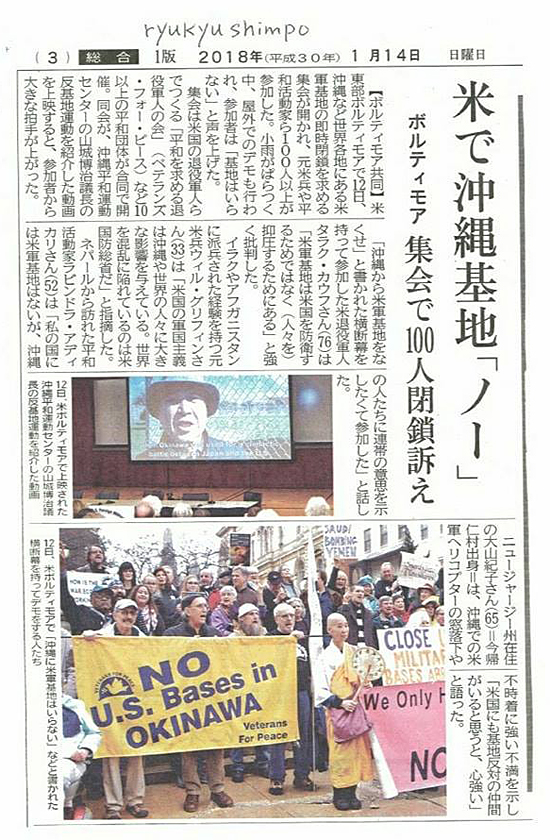
One of the groups present at the weekend conference was Okinawa Peace Appeal, an Okinawan group dedicated to spreading information about anti-base and peace activities in Okinawa. Okinawa, a prefecture of Japan, is home to one of the most fierce anti-base movements in the entire world. While many know of Okinawa as part of Japan, Okinawan people are actually the indigenous people of those islands, and only came to be part of Japan through annexation. Now, Okinawa is littered with 32 US bases, and is faced with the prospect of more. These bases are not welcomed by the people of Okinawa, with as many as 80% of the people in opposition to the bases. Okinawan Governor Takeshi Onaga ran on an anti-base platform, and continues to resist construction while being completely ignored by the Japanese government. These bases are constructed close to Okinawan communities, where Jet crashes often occur and result in the deaths of people. The most tragic incident was the 1959 crash of a US military jet into an elementary school in Okinawa that killed 18 people, including small children. The people of Okinawa have been sick of these bases. There is even an ongoing protest against the relocation of a base in Futenma that has recently reached 5,000 consecutive days! The Japanese government cracks down hard on protesters, the most prominent figure being Hiroji Yamashiro, a leader in the Okinawa anti-base protests, and someone who is facing a possible sentencing of up to 4 and a half years in prison for allegedly damaging a wire fence outside of the military base of Camp Schwab. If you really think the people of Okinawa want us there, you need to reconsider your position.
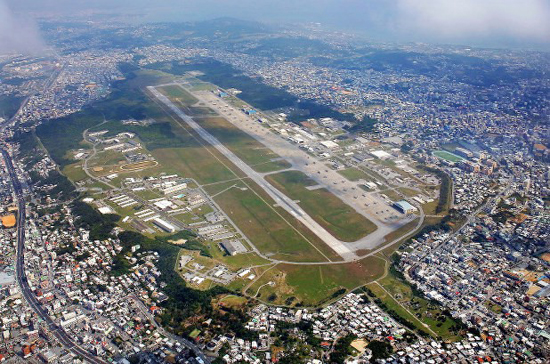
The Korean peninsula is a hotbed of diplomatic tensions, where the North and South are technically still at war. People in South Korea overwhelmingly want peace with the North, but the US insists on continuing the one policy that is keeping North Korea from coming to the table, which is the continued militarization of the Korean peninsula. The most recent military initiative on the Korean peninsula that is causing increased tensions is the deployment of the Terminal High Altitude Area Defense System (THAAD). This is an initiative that is intensifying military tensions in the Asia-Pacific and large numbers of people in South Korea are protesting its deployment. One of those organizations, the Task Force to Stop THAAD in Korea and Militarism in Asia and the Pacific, was present at the conference in Baltimore. The installation of this missile defense system is dangerous for two reasons. One, this missile system is seen not only as provocative by North Korea, but also China, which sees the system as part of an effort to encircle China with US military hardware. Two, the installation of the missile system puts a target on the community in which the system is installed if conflict were to ever break out. Moon Jae In, the current president of South Korea, ran on a platform that among other things, expressed many doubts about the THAAD deployment, and has since sought peace talks with North Korea and has on occasion challenged further deployments.
Other organizations present at the conference included Shannonwatch, a group of peace activists in Ireland who monitor flights in and out of Shannon, which contains an airport that for years has served as a transport hub for US soldiers going off to war in Iraq. Since 2002, over 2.5 million US troops have gone through Shannon airport. The airport has also been used by the CIA for rendition flights, connecting the supposedly neutral nation to US war crimes in more ways than one. I doubt the Irish people want to be party to war crimes and the people at Shannonwatch do not think so either. BAYAN USA, an organization that attempts to mobilize Filipinos in the US against imperialism, made their case for ending the US military presence in the Philippines. US Naval Base Subic Bay is the largest US naval base in the Asia-Pacific, and has always faced resistance from the people in the Philippines, even closing down in 1991 due to fierce protest and opposition which forced the government not to renew the agreement. The base is now once again being used, supposedly under new rules that only allow for refueling, but the base has also served as a transport hub for troops and materials used in military exercises in the area. Another important base to discuss is that of Ramstein Air Base in Germany, which faces fierce German opposition for it’s part in contributing to US drone operations, which flies in the face of German law. Norman Solomon calls Ramstein “The Most Important Air Force Base You’ve Never Heard Of” and the US Defense Department calls it “the largest American community outside of the US”. It supports 15 major combat operations, and it allows for the support of US special operations on the African continent.
Speaking of the African continent, there was an entire panel dedicated to the US Africa Command, or AFRICOM. AFRICOM was established in 2007 by the Bush Jr. administration. The idea faced unanimous rejection amongst African nations, so the US had to set up the command station in Stuttgart, Germany. Since its establishment, the US has rapidly increased its presence on the African continent, which has ironically coincided with a significant increase in terrorism. AFRICOM acknowledges the existence of 46 outposts scattered across 24 countries, a figure that has swelled over the years. The US public recently became aware of one of these major operations, with the ambush and killing of four US soldiers in Niger, including Sgt. LA David Johnson, whose killing sparked controversy after Donald Trump failed to deliver a proper sympathy call to Johnson’s widow. There are 800 US troops stationed in Niger, with Senators Lindsey Graham and Chuck Schumer publicly stating that they were unaware of the level of involvement in the country.
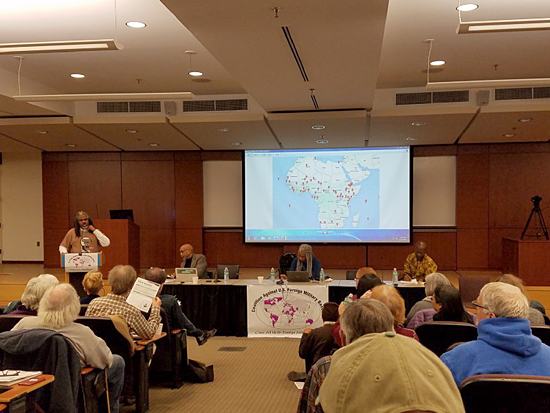
No foreign military base is more controversial than that of the detention facility in Guantanamo Bay, Cuba. January 11th marked the 16th anniversary of the detention facility’s opening, with 41 prisoners still populating the prison. Of those 41 prisoners, 31 have been held for years without facing any charges or trial. While the prison itself is a human rights catastrophe, the land on which it rests is a whole other issue. The US seized Cuba in the aftermath of the Spanish-American war, and granted Cuba independence only if it would sell land to the US on a perpetual lease that could only be broken by a mutual agreement between the two governments. Let’s be clear, the people of Cuba want their land back, and considering the lease for Guantanamo is based on a relic from the 19th century, that time is way past due. The only reason the Cuban government doesn’t take what is rightly theirs by force is because they would not win a war with the US Government, having a perpetual gun to their head telling them to “deal with it”. A delegation of people from Cuba were unable to participate in the conference due to the restrictions placed by the Trump administration on travel and commerce last November.
It would be dishonest to talk about foreign US military bases without discussing the very first foreign bases. As David Vine noted during his keynote speech at the conference, the first US foreign bases were those outside of the original 13 colonies that were used to go to war against the various nations of the Indigenous populations of the Americas. It is unfortunate that there was no representation from any Indigenous People at the conference, and the lack of diversity and inclusion were discussed during the strategy session, so hopefully going forward, the coalition will work to remedy that. A different perspective was provided by Netfa Freeman of Pan African Community Action who described the descendants of African people in America as internally colonized people who are under occupation from a domestic military in the form of US policing. Considering the increasing presence of foreign military training that US police undergo, that assertion is looking more and more accurate each day.
To close, it would be impossible within the scope of this tiny blog to state the importance of this conference, as well as express the level of energy and solidarity that took place within it. It was not the intention of this post to summarize in great detail the breadth of information that was learned during the various sessions. Ajamu Baraka spoke at the demonstration on the first day of the conference, and said that over the weekend “we’re going to struggle, we’re going to get information, we’re going to get energized so that we go back to our respective communities, our towns, cities, and rural areas and we build the kind of movement that’s representative of the best of this country” and I believe the conference was all of that and more. There certainly was struggle, as the room didn’t always have unanimity, and there was some healthy head butting that occurred. In the end, the coalition was able to pass three resolutions that enshrined action going forward. One was a global day of actions against Guantanamo, another was a national day of antiwar action, and the last was convening a global conference against US and NATO foreign military bases. I won’t give away any more details, because you always have to be aware of enemies who are watching, but in the end, there is an increasing movement around the world that is calling for peace and an end to US imperialism, and that is a beautiful struggle.
Michael Byrne is an antiwar activist who works in the Washington DC area. He holds a Master’s degree in International Relations from Cleveland State University. This is reprinted with permission from his blog.
.
.
